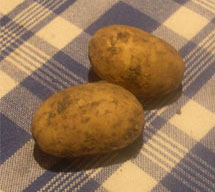The Grand Potato Challenge
Posted by Fiona Nevile in Cottage tales, Vegetables | 15 comments
Home grown potatoes
“If we have thirty feet of ridges , three potatoes wide, spaced a foot apart, we’ll need 90 seed potatoes. I’ve only chitted 2 kilos of seed potatoes. We won’t have enough.”
Danny and I were digging in our rich vegetable compost into the new potato border.
“We can cut the potatoes as long as each section has at least one eye.”
“Really?”
“Yes. I remember my Dad sitting on a wooden butter box and cutting up the potatoes with his sharp knife.”
Suddenly Danny has been fired with enthusiasm. Enough to overcome his loathing of outdoor work. The Grand Potato Challenge has finally brought out the competitive potato gardener in him.
He looked up planting, earthing and caring for potaoes on www.Google.ie. We motored down to Newmarket to buy more sulphate of potash and a bottle of whisky to guzzle a glass or two after a day on the potato bed cliff face.
“My ridges will be perfect with the potatoes evenly spaced. I want them to look good as much as I want to win the challenge.” Virgo to the bitter end.
It was fun working in the garden together, chatting as we forked in the compost. Potatoes need a lot of fertiliser in the soil. I was delighted. Digging alone can be wearisome and tough.
If you prepare the beds well, vegetable gardening is easy, maintenance wise. And there’s the rub. I’ve taken shortcuts in the past and the harvests have been thin. Even if you are longing to plant seed it’s well worth taking the time to dig your beds deeply, perhaps once or twice more than you think is sufficient. Incorporate loads of home made compost and scatter over potash of sulphate. The former is slow release goodness. The potash is a quick deft buzz, old fashioned but effective.
Everyone knows that the more that you put into your soil the more that you will take out. But the enthusiasm for planting can deflect from concentrating on the main shot. Incorporating good organic compost in Spring and Autumn, will reap benefits over the years. It’s slow but steady process. Beware, nitrogen rich fertilisers can initially give great results but can bleed the soil dry of nutrients in a handful of years if you use them too lavishly. It’s probably best to think slow and convert as much kitchen waste and lawn clippings as possible into compost. Wehave a compost heap that is managed by John Coe and a compost bin for kitchen waste and the chicken poop, managed by me.
John Coe and I add the compost from the twelve redundant grow bags to the kitchen garden borders in the autumn. And I dig in the greenhouse compost in the spring along with the rich compost from the burgening kitchen compost bin. Gradually over the years the soil in our kitchen garden borders is improving. I discover that the earth looks and feels better each spring. I rake off the stones and dream about a friable earth future.
We’ll leave the new potato plot to rest for a few days before we make the ridges and Danny plants the seed potatoes. Meanwhile, I have sprinkled potash of sulphate on John Coe’s two rows of potatoes. He has to have a sporting chance after all. I suspect that over the summer, I’ll be tending his two rows whilst D triumphs over his patch. The earth is so much better in the new patch. Wonderful text book soil. We are now planning to dig up half of the rose walk. The same friable soil with the prospect of loads more edible treats.
Leave a reply





Hello after a long absence.Iplanted some red skinned potatoes last year and got a reasonable crop from them. I did have quite a few”chats” left after harvesting and stored them and have planted some of them this year but will they grow? Re your using muscavado sugar in marmalade, I made two batches of mango chutney last year, one batch made with muscavado and one batch with granulated and the muscavado batch was quite superior in taste and texture. By the way my elderberry gin turned out to be so good after a six month rest. Cheers!